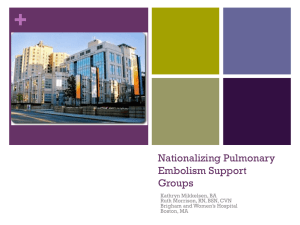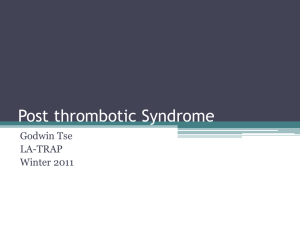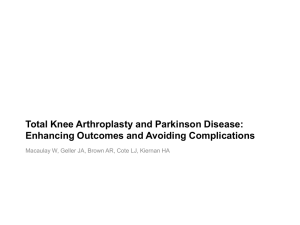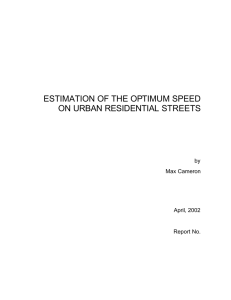Kings Mill Hospital Therapy Services (Physiotherapy)
advertisement
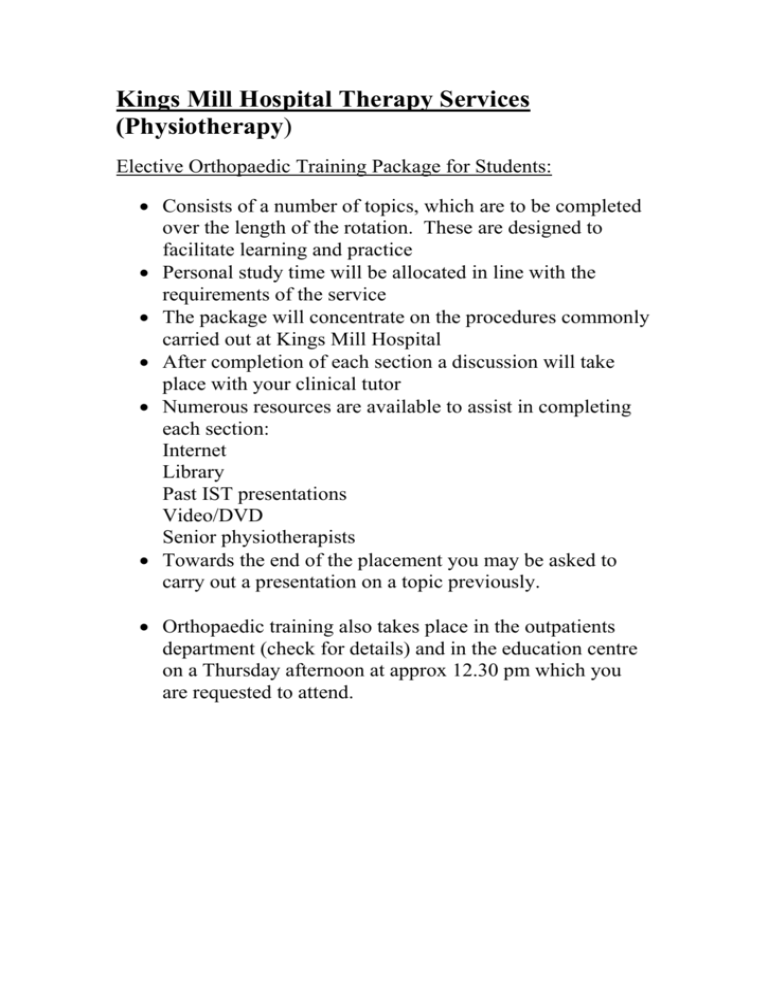
Kings Mill Hospital Therapy Services (Physiotherapy) Elective Orthopaedic Training Package for Students: Consists of a number of topics, which are to be completed over the length of the rotation. These are designed to facilitate learning and practice Personal study time will be allocated in line with the requirements of the service The package will concentrate on the procedures commonly carried out at Kings Mill Hospital After completion of each section a discussion will take place with your clinical tutor Numerous resources are available to assist in completing each section: Internet Library Past IST presentations Video/DVD Senior physiotherapists Towards the end of the placement you may be asked to carry out a presentation on a topic previously. Orthopaedic training also takes place in the outpatients department (check for details) and in the education centre on a Thursday afternoon at approx 12.30 pm which you are requested to attend. Week One-Total Knee Replacements Describe a typical patient history of someone who may require a TKR How would they possibly present to the assessing orthopaedic consultant How is their function affected What are the typical pathological processes involved Briefly describe a TKR operation Name the common prosthesis used at King’s Mill and why is any particular type used List the possible post-operative complications List the complications of bed rest What pre-treatment checks need to be adhered to at all times Describe a typical physiotherapeutic regime for a TKR patient. For example, day 1, day 2 etc Demonstrate to your senior/clinical tutor what type of exercises you would carry out and justify them Describe or show your senior/clinical tutor what a pre and post op X-ray may show What criteria needs to be achieved prior to discharge Week Two-Total Hip Replacements Describe a typical patient history of someone who may require a THR How would they possibly present to the assessing orthopaedic consultant How is their function affected What are the typical pathological processes involved Briefly describe a THR operation Name the common prosthesis used at King’s Mill Why would a surgeon use a particular type of prosthesis List some of the possible post-operative complications What pre-treatment checks need to be adhered to at all times Describe a typical physiotherapeutic regime for a THR patient. For example, day 1, day 2 etc Describe the precautions that patients with THR need to adhere to Demonstrate to your senior/clinical tutor what type of exercises you would carry out and justify them Briefly describe what hip re-surfacing is What criteria needs to be achieved prior to discharge Describe or show your senior/clinical tutor what a pre and post op X-ray may show Week Three-Deep Vein Thrombosis Thrombosis in veins following lower limb orthopaedic surgery is a common problem discuss the following: Pathology Who is predisposed to a DVT? Signs and symptoms How would you assess a patient with a suspected DVT As a physiotherapist what would you do if you suspected a DVT in a patient, post surgery? What investigations would you expect to be carried out? When would you mobilise the patient if a DVT is suspected or confirmed? 50% of patients following lower limb surgery such as TKR and THR will contract a DVT ‘without’ prophylaxis. What systems are in place at King’s Mill to prevent a DVT? What is the normal range for: WBC, INR, APTT, Platelets, Fibrinogen, C-reactive protein, HB and ESR? Why are these particular components of blood monitored and what is the significance of abnormal readings? Week Four-Total Shoulder Replacement Describe a typical patient history of someone who may require a TSR How would they possibly present to the assessing orthopaedic consultant How is their function affected What are the typical pathological processes involved Briefly describe a TSR operation Name the common prosthesis used at KMH What pre-treatment checks need to be adhered to at all times Describe a typical physiotherapeutic regime for a TSR patient Demonstrate to your senior/clinical tutor what type of exercises you would carry out and justify them What criteria needs to be achieved prior to discharge Describe or show your senior/clinical tutor what a pre and post op X-ray may show Week Five-Paediatric elective orthopaedics What is legg-calve-perthes disease? How is perthes diagnosed? How is perthes disease treated? (Surgically and Physiotherapeutically) What is a slipped capital femoral epiphysis? How is SUFE treated? (Surgically and Physiotherapeutically) Week Six-Elective Surgeries Name some of the common shoulder elective procedures carried out at KMH. Describe the indications for sub acromial decompression. Compare and contrast the post-op shoulder protocols that Mr Yousef and Kurian employ Describe the different types of Rotator cuff repair, and how does it affect the inpatient and outpatient physiotherapy treatment Name and briefly describe the common shoulder stabilisation procedures carried out at King’s Mill What is a frozen shoulder and a typically common pathway for these patients Name the common foot surgeries carried out at KMH. Describe the etiology and pathology of Hallux Valgus What does the elective surgery for Hallux Valgus involve? Briefly describe the post-operative physiotherapeutic regime for Hallux Valgus Student Training-Elective Orthopaedics


